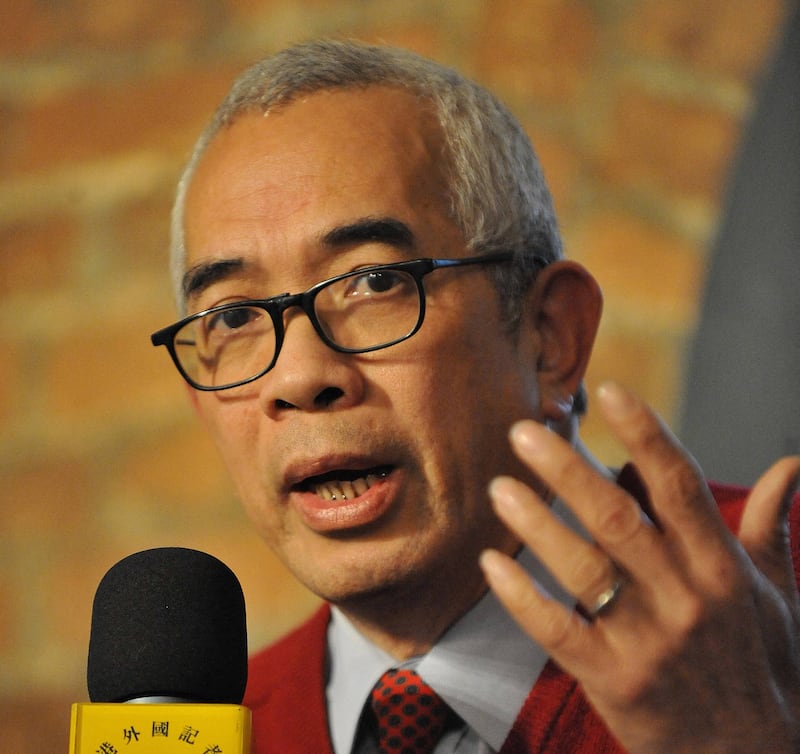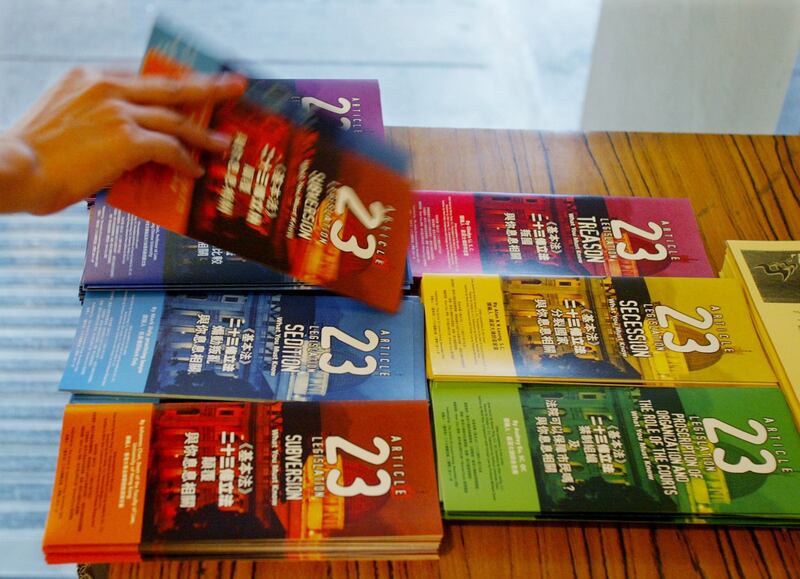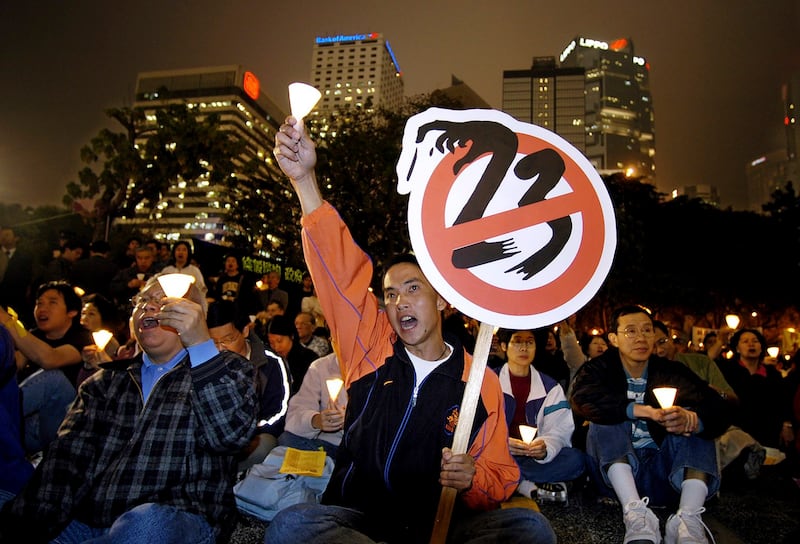More than 20 years after similar legislation was stalled following mass protests, the Hong Kong government has launched a public consultation on a rewritten draft of its planned Safeguarding National Security Ordinance, which will criminalize "treason," "insurrection," the theft of "state secrets," "sabotage" and "external interference," among other national security offenses.
The legislation, which is mandatory under Article 23 of Hong Kong's Basic Law, is being billed by the government as a way to close "loopholes " in the already stringent 2020 National Security Law, which was imposed on the city by Beijing, ushering in a crackdown on dissent in the wake of the 2019 protest movement.
The law is highly likely to be passed by the Legislative Council in the absence of any opposition lawmakers since electoral rules were changed to allow only "patriots" to run for election.
Debates about the content of the law began in the 1980s, and a close examination of its history sheds light on the political ideology and historical events that still drive Beijing's crackdown on dissent in Hong Kong to this day.

Hong Kong-based former Straits Times reporter Ching Cheong, who served a five-year prison sentence in China for "espionage" for doing his job, takes a look at the story behind the law:
Why has the Article 23 legislation been described as the “sword of Damocles” over Hong Kongers' heads?
Because essentially this law is the culmination of a long-running attempt to graft the ideology, political ideas, and behavioral patterns of the Chinese Communist Party's totalitarian system onto a pro-Western capitalist society that respects universal values.
Our sense of helplessness dates back to the history of the Sino-British [handover] negotiations, from which the people of Hong Kong were excluded with no say or control.
Weaker legal protections
Yet Hong Kong representatives on the Basic Law Drafting Committee did object to the requirement to legislate against acts of "subversion" and other crimes, because everyone believed that Article 23 legislation would deprive the people of Hong Kong of their rights and freedoms, particularly freedom of the press and freedom of speech, as well as weakening legal protections for Hong Kong citizens, giving the central government unlimited power, and introducing Chinese-style "counter revolutionary" crimes to Hong Kong.
Article 23 isn't mentioned at all in the 1984 Sino-British Joint Declaration [governing the 1997 handover].
Yet, if the government fails to legislate against "rebellion" effectively enough, Beijing can invoke Article 17 of the Basic Law, and impose direct, mainland-style governance in Hong Kong. This is in violation of the promise in the Sino-British Joint Declaration that Hong Kong would enjoy a "high degree of autonomy" after the handover.

Other objections during the 1980s were based on the differences between Hong Kong's common law judicial system and mainland China's civil law system, and on the vagueness of the definitions of "subversion" and [other crimes under the law]. For example, "subversion" isn't the same thing as treason under British rule.
Yet Hong Kongers have neither the right nor the wherewithal to subvert the Central People's Government in Beijing.
So this provision reveals the central government's extreme distrust of the Hong Kong government and its people, not to mention its own lack of self-confidence.
The Basic Law drafting committee pushed back against Article 23, insisting on a clearer definition of the crimes under the law, and calling for Article 23 not to apply to areas where people exercise their freedoms of speech, assembly, protest and petition.
They were also insistent that the legislation be drafted based on Hong Kong's legal system, rather than a piece of socialist legislation imposed on the city.
Tougher after June 4 protests
Then the student-led pro-democracy movement happened on Tiananmen Square, followed by the June 4, 1989 Tiananmen massacre, and the draft got tougher still.
Chinese officials wanted Hong Kong to legislate to prohibit "any act of treason, secession, sedition, subversion of the Central People's Government and theft of state secrets, prohibit foreign political organizations or groups from conducting political activities in the Hong Kong Special Administrative Region, and to prohibit political organizations or groups [there] from establishing contact with foreign political organizations or groups."
Article 23 now specified seven crimes, up from two in the first draft, and the drafting committee's objections were completely ignored.
Two of its most vocal members, Democratic Party founder Martin Lee and veteran pro-democracy politician Szeto Wah, were kicked off the committee after they protested against the killing of protesters and civilians on June 4, 1989.

They continued to argue that the Article 23 legislation could seriously affect freedom of speech and of publication. They even foresaw that Hong Kong activists overseas might not be covered by local laws, but could still run afoul of a Chinese law.
Fast forward to the imposition of Beijing's National Security Law on Hong Kong in 2020, and its content was exactly what the Basic Law drafting committee had envisioned for the Article 23 legislation three decades earlier.
The worst fears of the Basic Law drafting committee had come true.
After the handover in 1997, Chinese officials kept urging the Hong Kong government to legislate under Article 23. The direct trigger this time was their suppression of the Falun Gong spiritual movement, which rocked the ruling Chinese Communist Party regime in April 1999 with a mass gathering of its members outside Zhongnanhai, just meters from Tiananmen Square, in protest at denunciations of their practices in state media.
‘Evil cult’
The group also took over a radio station in a bid to counter negative official reports on its activities. It was later declared an "evil cult" by Beijing, its members detained and tortured and their organs harvested.
According to former Hong Kong Justice Secretary Elsie Leung, the Falun Gong's mass protests had roused the ire of then Chinese Communist Party General Secretary Jiang Zemin, who ordered a nationwide crackdown on the group.
The problem was, Leung told me, that Beijing was aware that the Falun Gong was still allowed to practice freely in Hong Kong, something that angered Jiang.
So much so that when he appointed Tung Chee-hwa as chief executive, he attached a condition that he must legislate under Article 23 as soon as possible, so that the Hong Kong government would have a legal basis to ban Falun Gong. He was actually required to complete this legislative work before July 1, 2003.
According to Leung, most of the "seven deadly sins" in the law were already covered by colonial-era legislation, with the exception of "prohibiting foreign political organizations or groups from conducting political activities in the Hong Kong Special Administrative Region."
Those laws could have been adapted to meet the requirements of Article 23 without the need for new laws, Leung said.
But Beijing wasn't having it. It insisted on a new law, which must contain a clause barring Hong Kongers from membership in organizations already banned in mainland China.
And there would be no fully democratic elections for either the Legislative Council or the Chief Executive without it, Leung said, citing Chinese officials at the time.
Hong Kong officials pushed back, arguing that without democracy, it would be impossible to legislate accurately so as to preserve the city's existing freedoms, if they didn't exist yet. But to no avail.
Eventually, the Hong Kong government released a consultation document in 2002 that was criticized for violating the United Nations-endorsed Johannesburg Principles governing national security and human rights law. Under these principles, restrictions to freedom of speech on the grounds of national security aren't legitimate if they seek to "entrench a particular ideology," rather than to stave off a violent threat of a military or internal nature.
Universal suffrage
Speech is only a legitimate target for national security legislation if it is likely to trigger immediate violence. But speech that peacefully requests a policy change, criticizes or insults a nation or its symbols or government, doesn't count as a national security crime, the principles say.
Any national security prosecution should place the burden of proof on governments to show that the defendant did in some way endanger the nation's survival or territorial integrity, according to a 2017 analysis by University of Hawaii law professor Carole Petersen.
In 2002, Baroness Frances D'Souza, who had a hand in drafting the "Johannesburg Principles," was invited to visit Hong Kong to comment on the Article 23 legislation. She told RFA Cantonese that the draft Article 23 legislation wasn't in line with the Johannesburg Principles.

Public opinion at the time indicated that the draft law should go before the Law Reform Commission before being tabled in the Legislative Council as a white paper draft.
But the government had already skipped a step in publishing a formal "blue paper" draft without issuing a "white paper" draft for public comment.
Then Chinese vice premier Qian Qichen weighed in, insinuating that anyone in Hong Kong who had a problem with the Article 23 legislation likely had a guilty conscience.
And Hong Kong's own Secretary for Security Regina Ip sneered at calls for universal suffrage, with the comment: "Hitler was elected under one person, one vote."
Asked about whether Hong Kongers would get a chance to comment on the draft law, she sneered: "So I have to listen to what the aunty who washes the dishes in McDonalds has to say?"
Ip's domineering attitude was one of the key reasons for the failure of the 2003 legislation.
The government's attempt to strong-arm the legislation meant that 500,000 people took to the streets on July 1, 2003 to protest the law, prompting even the pro-Beijing Liberal Party to withdraw its support for the bill in the Legislative Council.
Faced with the prospect of a humiliating defeat in LegCo, the government shelved the bill, while Ip resigned from her post.
Editor's note: On Jan. 12, 2024, the Hong Kong government released a draft of new legislation under Article 23 for public consultation, vowing to "eradicate the causes" of dissent that officials claim still linger in the city despite a 28-month-long crackdown on criticism of the authorities since the 2019 protest movement.
Translated and summarized by Luisetta Mudie .
